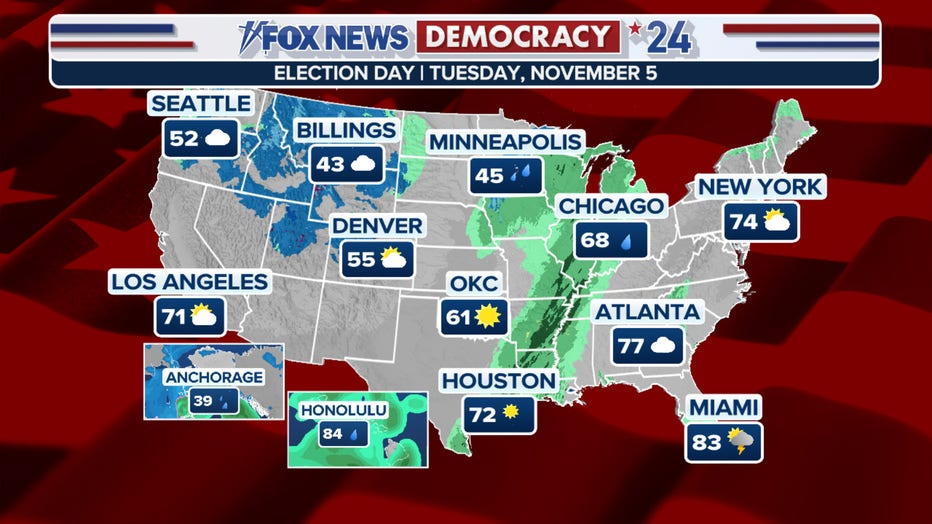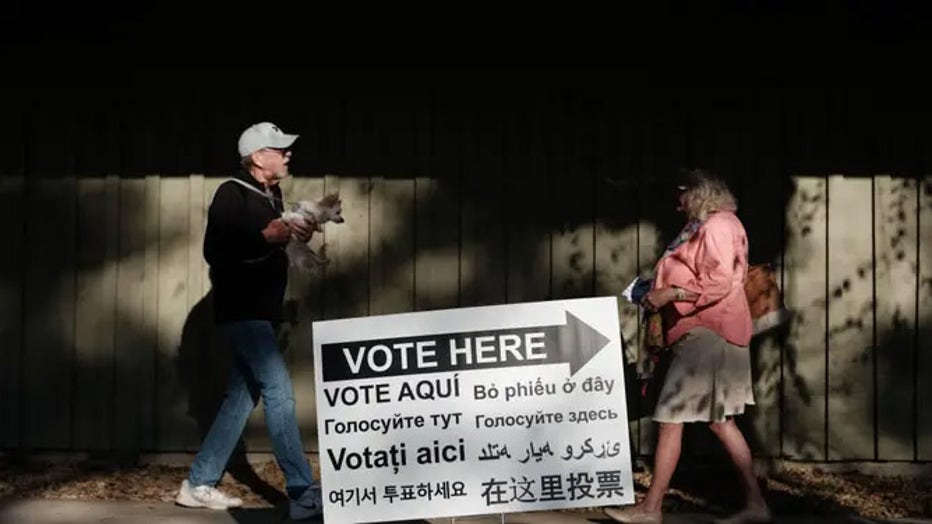2024 Election Day forecast: Could the weather have any impact on voting trends?
WASHINGTON - The weather forecast for most of the country will be rather tranquil for Election Day, with large parts of the East and West coasts remaining dry, but a cold front stretched across the heartland will be the focal point for scattered showers and thunderstorms.
The frontal boundary will mean cities such as Chicago, St. Louis and even Tulsa, Oklahoma, will be in the rain zone, and behind the front, cooler air will exist over much of the Rockies and Plains. Those in the Northwest could have snow in the forecast for Election Day.

Tuesday, Nov. 5, Election Day forecast. (FOX Weather)
According to the FOX Forecast Center, some battleground states, including Michigan and Wisconsin, are likely to see rain on Election Day. Meanwhile, temperatures in northern Nevada are expected to dip below freezing, where snow is possible.
Voters in western North Carolina will be casting their ballots in the wake of Helene's deadly flooding. As cleanup efforts continue in the region, temperatures will be in the 50s and 60s in places like Asheville, which was hit hard by the devastating flooding.

A couple meets after voting at an early voting polling station in Black Mountain, North Carolina, on October 29, 2024, one month after the hurricane Helene hit the area. (Photo by Yasuyoshi CHIBA / AFP via Getty Images)
Political experts contend weather conditions on Election Day – whether rainy or sunny – can influence voter enthusiasm. However, with over half the country voting in advance of Nov. 5, Election Day increasingly resembles an extended election season rather than just a single, important day.
A 2007 university study found that Republican-leaning voters turned out more than those voting for Democrats during rainy weather. Researchers found that voter participation dropped off about 1% per inch of rain, and snowfall decreased turnout by nearly half of a percent for every inch of accumulation.
With the majority of the electorate taking advantage of early voting methods, millions will have little to do on Election Day other than relax and watch the results come in.
Dr. David Richards, an associate professor and political chair at the University of Lynchburg, has been watching voting trends for decades and says changes are occurring.
"In-person early voting has skyrocketed as people sort of get used to the idea that there’s time for them to go vote," Richards said. "They don’t have to wait and do it on Election Day – the way that they’ve traditionally done it. It’s a generational shift that has taken a couple of election cycles for people to get comfortable with it."
On the temperature front, most of the country will be experiencing warmer-than-average readings, with pockets of chilly air centered over Utah and the western U.S.
Impact of hurricanes on recent elections
Hurricanes Helene and Milton carved a path of destruction through several battleground states, leading to changes in the voting process.
In hard-hit North Carolina, the State Board of Elections made it easier for residents of the 13 most heavily impacted counties to vote.
The North Carolina State Board of Elections reports that efforts include allowing voters to pick up their absentee ballots from their local county board of elections office up until the day before the election and return them to any polling place or county election office through Nov. 5.
Other accommodations were made in Florida and Georgia to ease the stress of voting for hurricane victims.
Despite the damage caused by the multi-billion disasters, impacts to the electoral system appear to be minor and are not preventing people from voting.
"I think it’s interesting to see that it doesn’t appear to be depressing turnout and that we saw those record first days in North Carolina and Georgia, which were the hardest hit states, especially from the first storm," Richards said.
In fact, these disasters may actually serve as a galvanizing force among likely voters.
Richards suggested that residents might head to the polls early to avoid being trapped by a future disaster or to assess the government’s response.
Major disasters, such as widespread flooding and hurricanes, have long influenced voter enthusiasm in the lead-up to significant elections.
For instance, in 1992, the FEMA response to Hurricane Andrew in South Florida was largely viewed as inadequate by the public, putting the state’s 25 electoral votes up for grabs.
Similarly, in 2012, Superstorm Sandy swept through the eastern U.S., impacting the reelection of President Barack Obama.
At that time, national exit polling indicated that the hurricane response was an important factor for 15% of voters.
Despite five landfalling systems during the 2024 hurricane season, Richards noted that extensive research will likely be necessary to determine whether extreme weather had any effect on the voting public.
WEATHER CAN IMPACT VOTER TURNOUT
Coping with election stress

How to cope with election stress
Matt Polacheck, a psychologist and mental health expert, joins Battleground to talk about how the barrage of news, campaign ads and robocalls for the 2024 presidential election can impact your mental health.
One of the main questions Richards said he is getting from his students and the public at large revolves around waiting for the votes to be tabulated.
Many are what he calls "doom-scrolling" through social media to try to figure out which candidate could be in the lead – to which the political professor advises against and offers some guidance.
"I would encourage people to go outside. Politics is very important, but at the end of the day, there are a lot of things in life that matter – many other things you can focus on: your job, your family, your recreational time. There’s going to be a winner, and there’s going to be a loser. That’s how our process works. And it’s not the end of the world," Richards stated.
For those interested in the results, Richards said there are some races in Virginia and across the nation to watch that resemble a barometer for the country.
In the Commonwealth of Virginia, a race to watch will be the Second Congressional District for the House – the district usually is a barometer for which party will be in control of the U.S. House of Representatives.
And in Ohio and Montana, incumbent senators are running for reelection, which could help sway the balance of power in the upper house of the United States Congress.
To watch live election results: Click here.
LINK: GET MORE ON THIS STORY FROM FOXWEATHER.COM

